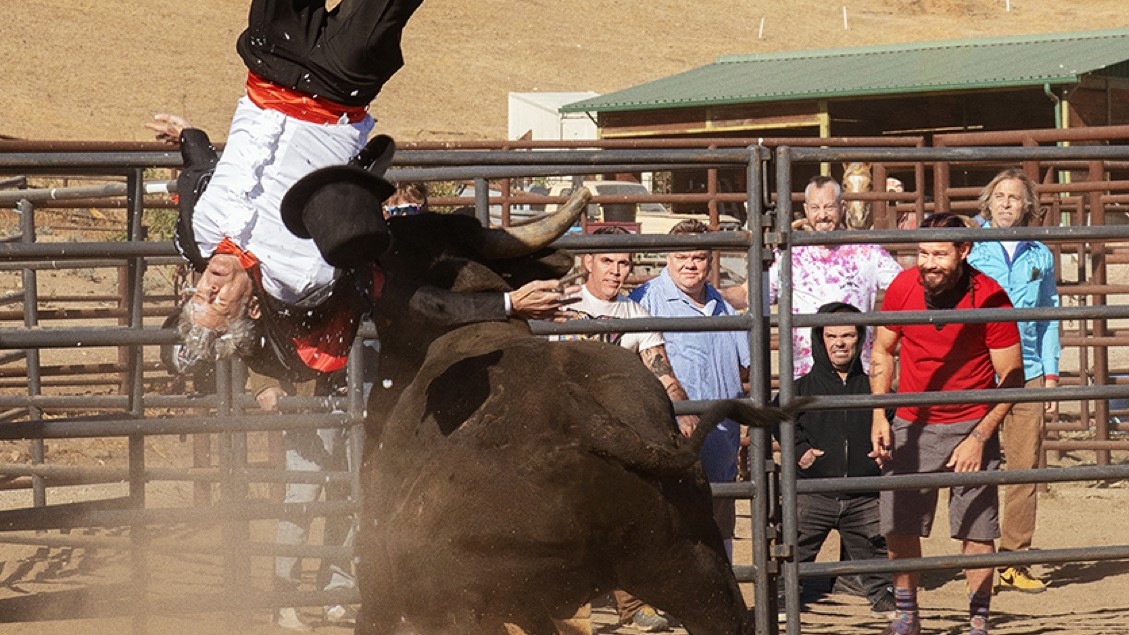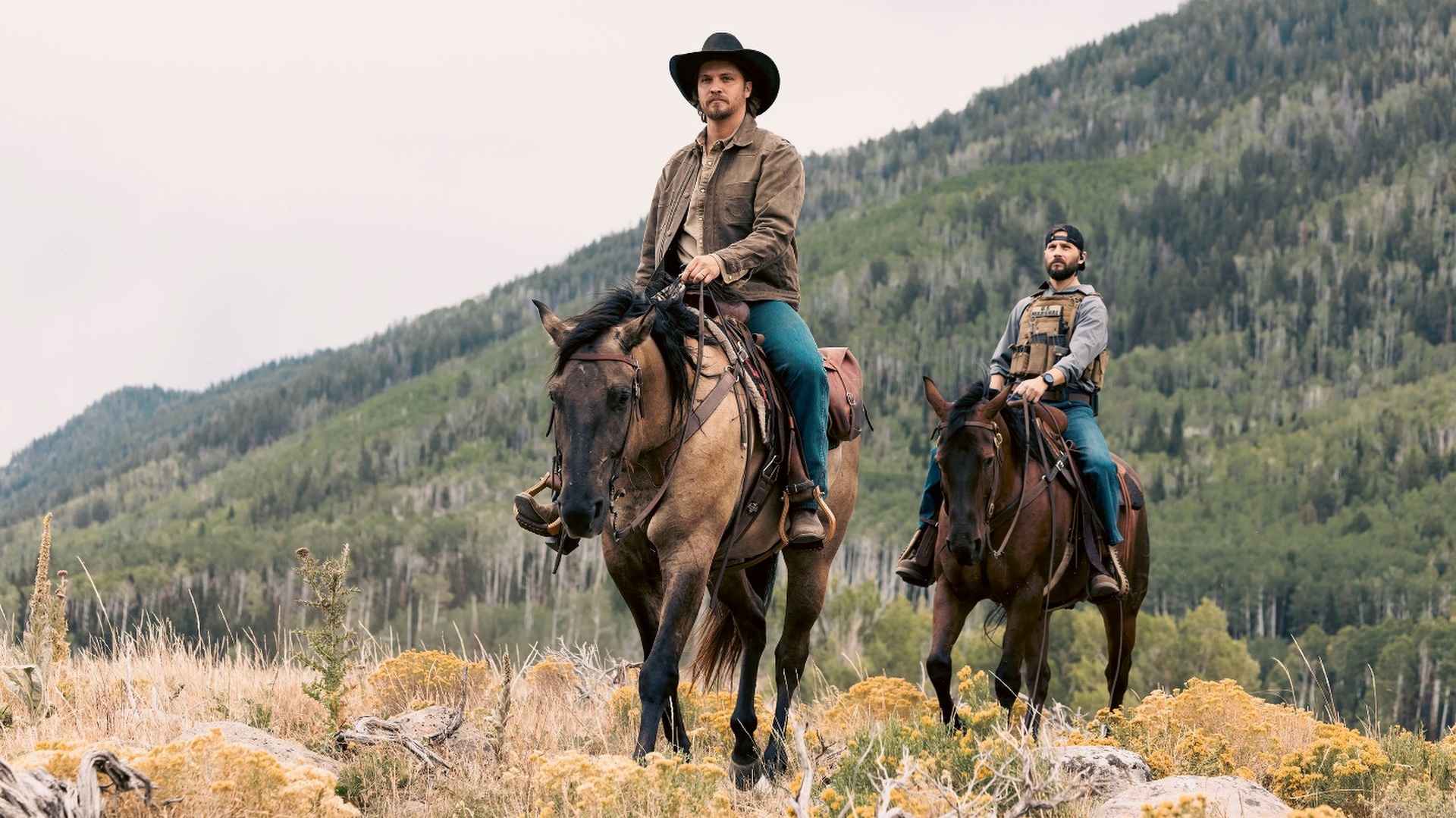What to Watch Verdict
While as a whole it falls just short of the series' masterpiece 'Jackass Number Two,' this swan-song offers enough unforgettable gags to make it worthy of its predecessors.
Pros
- +
Johnny Knoxville's delight at every single stunt keeps proceedings essentially light no matter how mean or painful they become
- +
The series continues to derive an unparalleled joy and positivity from male camaraderie even at its most mischievous
Cons
- -
The film's body positivity is inspiring, but one occasionally wishes the cast indulged in some bathing positivity
After 22 years, this endlessly immature generational touchstone gives audiences one more unforgettable punch to the funny bone.
Given Jackass' arrival just ahead of the turn-of-the-century explosion of reality television (not to mention the dawn of DIY YouTube stardom), it’s no surprise that the series has become a generational touchstone. What is remarkable is the number of generations for which it has become one. If Jackass Forever is the series’ swan song, the fourth film pays more than satisfying tribute to the enduring charm of Johnny Knoxville and his pals subjecting themselves (and one another) to increasingly disgusting, painful and just plain stupid stunts.
At a tight 96 minutes, Jeff Tremaine’s final-for-now anthology not only succinctly and respectfully honors some of Jackass’ most inspired ideas, but hilariously ups the ante on more than two decades of moronic hijinks.
As welcome as it is to get to experience this throat-clearing (not to mention belly and bowels-emptying) big-screen finale for the series, its arrival serves as a painful reminder that the show’s cast has aged considerably in the 22 years since its premiere, even if they don’t act like it. Understandably, more than a handful of the original actors and collaborators elected not to return, including Brandon DiCamillo, Chris “Raab Himself” Raab, Dimitry Elyashkevich and Loomis Fall, while Bam Margera was fired due to substance abuse and Ryan Dunn died in a car crash in 2011. But Knoxville still plays ringleader and sometime guinea pig with the same delight as before, while most crucially, his hosting maintains the essential tone of camaraderie, fun and feckless exuberance the sequences need in order to not become unwatchable, even (and especially) when they’re deeply cringeworthy.
Thankfully, the rest of the cast members have only further embraced the personas and niches that set them apart from one another: Chris Pontius continues to use his penis as a bullseye with an alarming amount of puerile joy; Dave England wanders through stunts like something important was knocked loose in his head long before the cameras started rolling; Wee Man counterbalances his diminutive stature with gleeful fearlessness; Ehren “Danger Ehren” McGhehey repeatedly agrees to the most brutal and unenviable bits and then seems indefatigably regretful while he endures them; and Steve-O guffaws his way into the middle of the most harebrained stunts, screams bloody murder and then goes back to guffawing.
Simultaneously, new cast members have risen to replace the absentees and offset the original Jackasses’ aging stupidity with their own more youthful version. In particular, Sean “Poopies” McInerney seems destined to follow in England’s footsteps — not quite smart enough to realize when he’s made a bad decision until he’s halfway through dealing with its consequences. Zach Holmes is similarly a next-generation version of Preston Lacy’s disheveled punching bag, while Rachel Wolfson holds her own (and them some) as the series’ first official female cast member.
But it’s African-American son and father Jasper Dolphin and Compston “Dark Shark” Wilson who kind of best encapsulate Jackass’ longevity by offering multigenerational takes on participating in stunts while appropriately observing how many of them are driven by a kind of stupidity that definitely isn’t exclusive to its mainly white cast but seems to be indulged by them the most often.
The latest updates, reviews and unmissable series to watch and more!
Whether it’s a warning or enticement, this fourth film seems to have the most material centered around male genitalia, and Tremaine gets more and more frequently intimate with his stars’ bodies than ever before, from an opening bit involving Pontius’ penis threatening a city like Godzilla to an escalating series of cup tests administered to Danger Ehren by sports stars from the worlds of MMA, hockey and softball. As always, seminal fluid (real and manufactured, human and animal) makes multiple appearances, and exotic animals are frequently used to torment the cast and inflict pain.
Some of the best bits are the ones in which cast members anticipate mistreatment that is delayed, misdirected or never comes; an early sequence with a rattlesnake generates some of the film’s biggest laughs after Knoxville cuts out the lights on the artificial set, removes the snake without the cast knowing and then mercilessly threatens them with surfaces and sensations that convince them they’re a bite away from certain death.
Tremaine as always finds inventive ways to film the stunts, frequently using high-speed digital cameras to reveal pivotal or excessively unpleasant moments that the participants experience. Meanwhile, it’s longtime collaborator Spike Jonze who applies the biggest imprint of cinematic sweep with the opening “dongzilla” set piece, luxuriating in the immaturity of the set-up while showcasing his own skill as a filmmaker.
Ultimately, it’s the shots of cameraman Lance Bangs gagging at an especially pungent stunt that kind of weirdly cement the transcendence of creativity explored in this series. Tremaine can coach from the sidelines and Knoxville will always be there to double over in amusement, but there’s just something about the guy with the fortitude to aim his camera directly up Steve-O’s taint reaching his limit that makes you feel like, well, you’re watching something truly magical.
In recreating a handful of classic stunts, the film again reminds you how much the cast has gone through and for how long. Knoxville reportedly was diagnosed with brain damage after facing down an angry bull here for his second time, and even if he was willing to do it, none of it is worth permanent injury — no matter how hard it makes audiences laugh. This film is as much a catharsis for the last two years of everyone’s life as it is a coda for the last 22 of its stars: if we’ve earned the right to escape our isolation and inactivity to watch these dummies thrash themselves one more time, they’ve more than earned the right at long last to stop.
Jackass Forever falls just short of the masterpiece that is Jackass Number Two, but at a moment where it's desperately need and with a depth we couldn't have expected, the movie offers an experience unlike any other to make audiences choke up — and whether it’s because of laughs, tears or vomit, all are equally appropriate.
Jackass Forever releases exclusively in movie theaters on Feb. 4.
Todd Gilchrist is a Los Angeles-based film critic and entertainment journalist with more than 20 years’ experience for dozens of print and online outlets, including Variety, The Hollywood Reporter, Entertainment Weekly and Fangoria. An obsessive soundtrack collector, sneaker aficionado and member of the Los Angeles Film Critics Association, Todd currently lives in Silverlake, California with his amazing wife Julie, two cats Beatrix and Biscuit, and several thousand books, vinyl records and Blu-rays.


